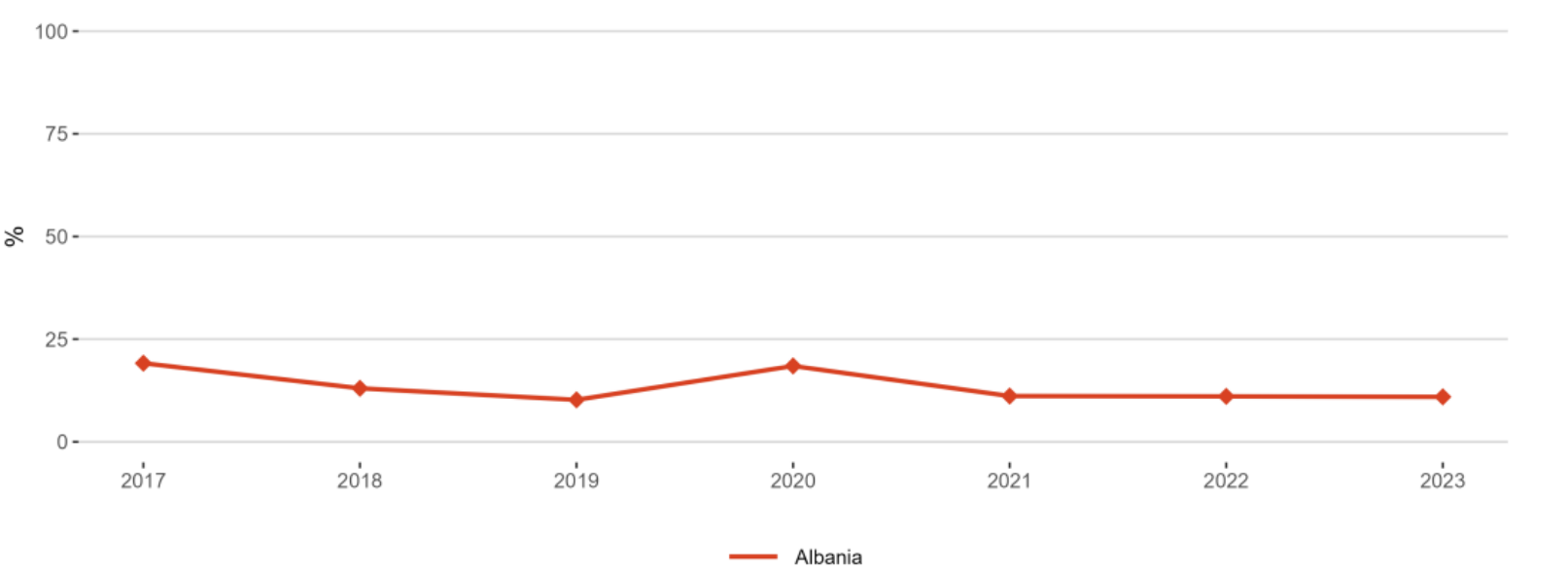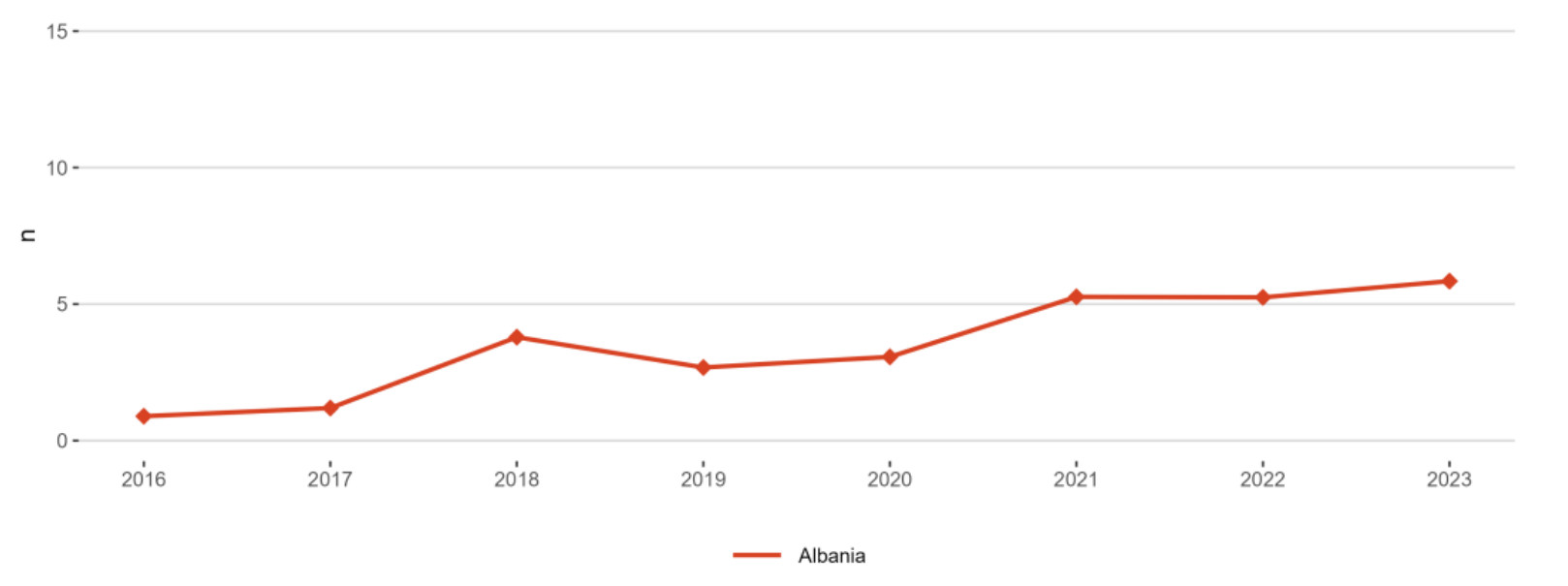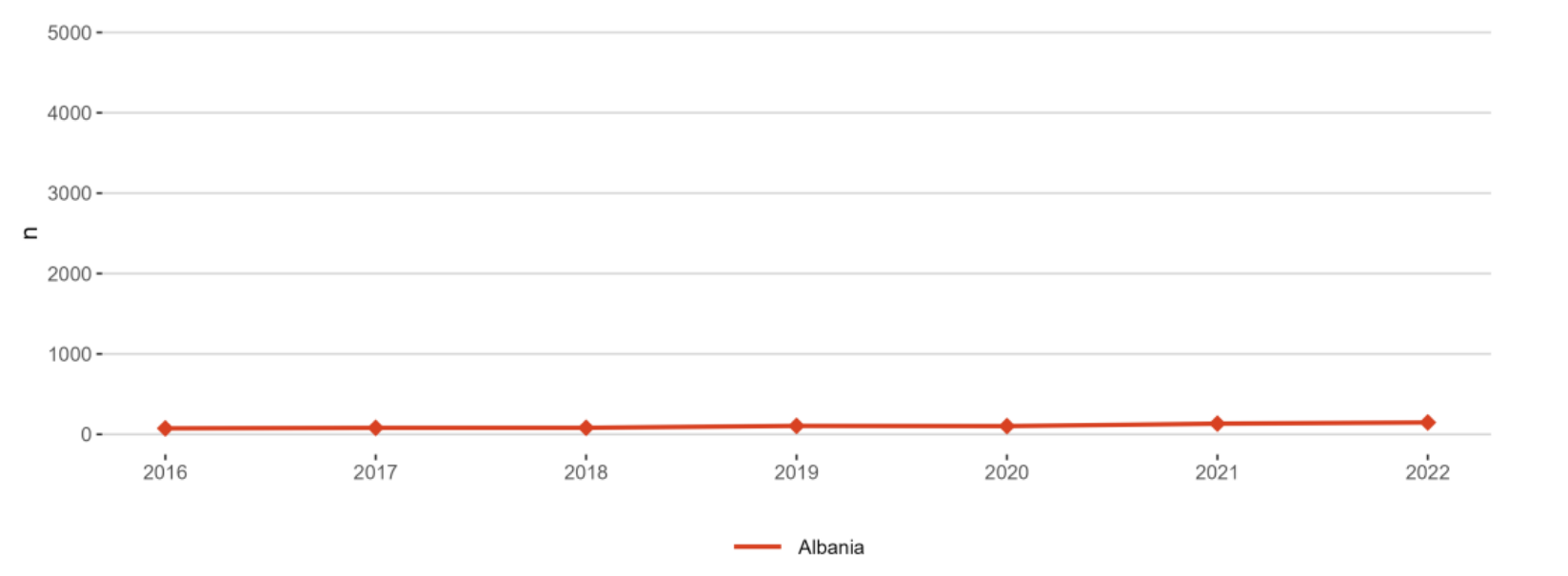ERA Country Report 2023
Albania
Edited by Armela Dino
as part of the project “POLICY ANSWERS: R&I Policy making, implementation and Support in the Western Balkans” funded by the HORIZON EUROPE programme of the European Union under Grant agreement ID: 101058873
Click here to download this country report![]()
- Table of contents
-
ERA Country Report 2023: Albania
1. National context
1.1. Overview of the ERA policy agenda implementation
1.2. Policy context
2. Implementation of the ERA policy agenda
2.1. ERA Priority 1: Deepening a truly functional internal market for knowledge
2.2. ERA Priority 2: Taking up together the challenges posed by the twin green and digital transition and increasing society’s participation in the ERA
2.3. ERA Priority 3: Enhancing access to research and innovation excellence and enhancing interconnections between innovation ecosystems across the EU
2.4. ERA Priority 4: Advancing concerted research and innovation investments and reforms
3. Country-specific drivers and barriers
4. Final remarks
5. Bibliography
6. Annexes
ERA Country Report 2023: Albania
|
Key takeaways:
|
1. National context
1.1. Overview of the ERA policy agenda implementation
Albania has consolidated its work towards the implementation of the European Research Area (ERA) Policy Agenda 2022-2024. The country, in spite of limited data availability, has participated in the European Innovation Scoreboard (EIS) 2023, where it is considered as an “Emerging Innovator”, showing its highest performance on sales of innovative products and Environment-related technologies. In addition, performance has increased strongly on Population with tertiary education, and Most-cited publications. Nevertheless, its overall performance stands at 41.1% of the EU average, below the average of the Emerging Innovators. Overall, performance is increasing, but at a rate lower than that of the EU (8.5%- points), and therefore the country’s performance gap to the EU is becoming larger.
Albania has not “officially” committed to the ERA Actions recognised in the Annex of the Council Conclusions on the Future governance of the ERA adopted on 26 November 2021. Nevertheless, Albania has aligned its national strategies to the ERA Policy Agenda for the ERA development and implementation, as a whole. The Albanian normative and strategic framework are aligned with the ERA Policy Agenda 2022-2024, such as the new draft Law to be further developed and launched in 2023 and the National Strategy for Science, Technology and Innovation.
1.2. Policy context
The Albanian national research system is regulated by the “Albanian Law 80/2015 on Higher Education and Scientific Research in the Higher Education Institutions”. A new law is supposed to be released in 2023. The “National Strategy for Science, Technology and Innovation 2017-2022” identifies key policies, a vision, goals and strategic objectives for the development of scientific research, technology and innovation by harmonising it with the principles of the ERA. The new “National Strategy for Science, Technology and Innovation 2023-2030 has been adopted by the government in 2023. The Ministry of Education and Sport (MES) leads the implementation of the National Strategy for Science, Technology and Innovation. The funding of research is carried out by the National Agency of Scientific Research and Innovation (NASRI) that responds to the ministry. NASRI is also responsible for the promotion of Albanian participation in Horizon Europe and other European initiatives.
Statistics on research and innovation (R&I) need more effort of improvement in terms of data quality, and funding of education and research are below what the system needs. The allocated budgetary funds of the main ministries remain negligible.
2. Implementation of the ERA policy agenda
2.1. ERA Priority 1: Deepening a truly functional internal market for knowledge
This priority includes nine ERA Actions, i.e.: 1) Enable Open Science, including through the European Open Science Cloud (EOSC); 2) Propose an EU copyright and data legislative framework for research; 3) Reform the Assessment System for research, researchers and institutions; 4) Promote attractive research careers, talent circulation and mobility; 5) Promote gender equality and foster inclusiveness; 6) Protect academic freedom in Europe; 7) Upgrade EU guidance for a better knowledge valorisation; 8) Strengthen research infrastructures; and 9.) Promote international cooperation.
Albania has advanced on a few of these aspects. As regards Open Science, the new policy is already included in the future Draft Law of Science, expected in 2023. In the review of the Economic Recovery Plan (ERP) 2021-2023, the government is planning to create a platform for promoting Open Science in 2023, but this is not operative to-date (November 2023). Scopus data retrieved in November 2023 show that out of a total of 4,043 publications in Open Access, 1,918 are in Gold (47%) and 2,470 publications are in Green (61%). Given the low access to databases by Albanian institutions and the lack of institutional support to publish in OA (due to fees), these OA publications are an outcome of the international collaborations Albanian researchers have. Data retrieved from SciVal in November 2023 indicate that the quality of these publications is rising in the years, for example the field weighted citation impact rose from 1,05 in 2018 to 1,16 in 2022. As regards the quantity, the publications in the top first decile have oscillated from 14,2% in 2018, to 15,4% in 2021 and 12,3% in 2022 showing that above 10% of the Albanian publications are excellent in overall terms. As regards the promotion of attractive research careers, talent circulation and mobility, 23 Albanian entities have endorsed the European Charter for Researchers and the Code of Conduct for the recruitment of researchers. The University of Tirana has achieved the Human Resources Strategy for Researchers (HRS4R) label. The review of the National Economic Reform Programme envisages further support on the implementation of Charter and Code among the Albanian institutions for 2024. Regarding diploma recognition and researcher mobility, cooperation between North Macedonia, Kosovo*, and Serbia resulted in the mutual recognition of university degrees in June 2022. The EURAXESS profile of Albania is yet to be exploited and more positions are to be advertised.
As regards work on knowledge valorisation and the promotion of knowledge circulation and collaboration of research centres and businesses, the new draft Law of Science includes the creation of Knowledge Transfer Centres and recognises knowledge valorisation as an integral part of the researcher’s activity.
As regards Strengthening Research Infrastructure, the new Draft Law of Science envisages the increasing use of scientific research infrastructure by fostering Open Access. The review of the EPR envisages the Mapping of Research Infrastructures in 2024. The Albanian R&I system suffers from a lack of adequate research facilities, labs and research infrastructures to perform research at all levels.
Regarding the promotion of International Cooperation, the Albanian government representatives have organised bilateral visits with European and non-European counterparts with the objective to internationalise their institutions, especially universities. Albania (through NASRI) has in place four bilateral international initiatives with Italy, Austria, Turkey and Kosovo (with ten projects and four researchers per project each). In addition, NASRI has got an agreement with Malaysia, yet to be implemented.
2.2. ERA Priority 2: Taking up together the challenges posed by the twin green and digital transition and increasing society’s participation in the ERA
This priority includes five ERA Actions, i.e.: 10) Make EU research and innovation missions and partnerships key contributors to the ERA; 11) An ERA for green transformation; 12) Accelerate the green/digital transition of Europe’s key industrial ecosystems; 13) Empower Higher Education Institutions; and 14) Bring science closer to citizens.
Such as the EIS 2023 indicates, Albania’s highest score for 2022 was the performance on Sales of innovative products and Environment-related technologies. This shows that the country’s ecosystem is dynamic in environment-related technologies. As regards the missions and partnerships, Albania has been involved in Mission Ocean and in nine European Partnerships ^ : ARIMNet, Biodiversa-plus, GeoERA, EUPHRESCO, JPND, MARTEC II, SEE-ERA.NET, Plus and SEERA-EI such as seen under https://www.era-learn.eu/.
2.3. ERA Priority 3: Enhancing access to research and innovation excellence and enhancing interconnections between innovation ecosystems across the EU
This priority includes two ERA Actions: Action 16 aims to improve EU-wide access to excellence while action 17 seeks to boost the strategic capacity of public research institutions’. As regards Action 16, NASRI serves as the national organisation for the COST programme and actions in Albania. More than 400 researchers are already participating in various COST actions. Each COST action includes at least a network of 50 EU researchers. Currently, there are 292 running COST actions with Albania participating in 74% of them. This is a huge interconnection between the innovation ecosystem across the EU and Albania and supports the improvement of EU-wide access to excellence. Nevertheless, Action 16 of the ERA Policy Agenda goes beyond the COST programme and focuses on creating synergies between the research and the structural funds programmes.
2.4. ERA Priority 4: Advancing concerted research and innovation investments and reforms
This priority includes one ERA Action, i.e.: 19.) Establish an ERA Monitoring System. The European Commission (EC) is creating now the so-called ERA Dashboard that will include information from all the Associated Countries. Albania is contributing with data for two years now to the European Innovation Scoreboard, and it participated in the EIS 2023 with data from 2022, although 23 of its indicators show little reliability due to the data quality. It is crucial that the country’s authorities will contribute to the ERA Monitoring System in line with the contribution to the EIS and European integration.
Albania is making a significant effort to improve its innovation capabilities. The launch of the portal https://euforinnovation.al/, the future launch of the EIT Raw Materials KIC (Knowledge and Innovation Community) and Elbasan being in the Cities Mission show the nascent of a vibrant innovative community in the country.
3. Country-specific drivers and barriers
The country-specific drivers for the implementation of the ERA Policy Agenda 2022-2024 are:
- The participation of Albania in the European statistics in R&I as the EIS and “She Figures” demonstrate a minimum validity of its data collection and reliability.
- R&I is considered a priority at the highest political level and for international relations, such as seen in the ERP 2021-2023 and its impacts are to be further seen.
- There is an increasing number of international scientific publications with good citation records which shows that the Albanian scientific community is becoming more active and internationalised with time.
- The new Draft Law of Science incorporates three aspects of key importance for the integration in and the implementation of the ERA, i.e.: Open Science, Research Infrastructure and Knowledge Valorisation.
- The development of capacities in R&I in Albania as a geopolitical actor in the Western Balkans can be a driver for a faster implementation of the ERA Policy Agenda. The new free-trade zone to be put in place in the Balkans and the efforts towards innovation that the country is making (the https://euforinnovation.al/ portal, the EIT Raw Materials KIC and the city of Elbasan contributing to the EU Cities Mission) show good results for a future innovative country.
The country-specific barriers for the implementation of the ERA Policy Agenda 2022-2024 are:
- The lack of sustained funding and vision can be a barrier for the implementation of strategies and the Draft Law expected in the near future. The new aspects developed by the law should be put in practice with determination.
- The lack of professionalisation in the research management and the lack of support is a barrier to participation and leadership in European and international projects, and therefore the development of the ERA.
- Limiting STEM (science, technology, engineering and mathematics) areas to only teaching can hinder the future Albanian scientific and technological workforce.
- The absence of vision in Knowledge Valorisation and Transfer maintains the research performing organisations disconnected from the productive sector. The support to the Knowledge Transfer Centres should be well articulated. The lack of adequate spaces where companies can meet researchers can aggravate the disconnection between the higher education and the productive sector.
- The lack of access to research publications maintains the “iron curtain” in the nationally driven research activity.
4. Final remarks
Albania has achieved significant progress towards the contribution and development of the ERA Policy Agenda 2022-2024, although no formal commitment has been transmitted to any of the specific Actions that encompass the ERA Policy Agenda.
Albania continues to contribute with statistical data to the European analysis of the EIS, yet 23 of the indicators are not considered fully reliable due to the data quality.
The new Law on Science including Open Science, Knowledge Valorisation, and Research Infrastructure and Facilities will support a stronger R&I ecosystem aligned with the ERA Policy Agenda priorities.
Under ERA Priority 1 “Deepening a truly functional internal market for knowledge”, the aspects of Open Science (OS) are included in the new Draft Law and a new platform to promote OS is expected to be created, such as planned by the Economic Reform Programme 2021-2023, by the year 2023. As regards the promotion of research talent, careers and mobility, the Albanian institutions are endorsing the Charter and Code for Researchers of the EC; the University of Tirana has achieved the Seal of Excellence HRS4R. Diploma recognition and researcher mobility is fostered with North Macedonia and Kosovo. The Albanian EURAXESS profile is operational, yet to be exploited. As regards Knowledge Valorisation, the new Draft Law envisions the creation of Knowledge Transfer Centres – the first ones in the country. As regards Research Infrastructures, the new law indicates the support and creation of research facilities that are open to all. As regards international collaboration, Albania is committed to science diplomacy in the Western Balkans. In addition, NASRI has concluded bilateral agreements with several countries in the past years.
Under ERA Priority 2 “Taking up together the challenges posed by the twin Green and Digital Transition and increasing society’s participation in the ERA”, Albania has shown its highest performance in ‘sales of innovative products and environment-related technologies’. Albania participates actively in Missions and European Partnerships.
Under ERA Priority 3 “Enhancing access to research and innovation excellence and enhancing interconnections between innovation ecosystems across the EU” as well as under ERA Priority 4 “Advancing concerted research and innovation investments and reforms”, there is little evidence on activities related to these actions.
5. Bibliography
European Commission. European Innovation Scoreboard 2023 Country Profile Albania (2023) Available at: https://ec.europa.eu/assets/rtd/eis/2023/ec_rtd_eis-country-profile-al.pdf
Council of the European Union. Future governance of the European Research Area (ERA); - Council conclusions (adopted on 26/11/2021) Available at: https://data.consilium.europa.eu/doc/document/ST-14308-2021-INIT/en/pdf
European Commission. Commission Staff Working Document. Albania 2022 Report. Accompanying the document Communication from the Commission to the European Parliament, the Council, the European Economic and Social Committee and the Committee of the Regions 2022 Communication on EU Enlargement policy (2022) Available at: https://neighbourhood-enlargement.ec.europa.eu/system/files/2022-10/Albania%20Report%202022.pdf
Regional Cooperation Council. Research Infrastructure Roadmap for Albania. (2022) Available at: https://www.rcc.int/download/docs/RI%20Roadmap%20Albania%20digital.pdf/c4abcbbc24ec0f623156ef8b257adebf.pdf
European Commission. Joint Research Centre. Smart Specialisation Platform in Albania. Available at: https://S3platform.jrc.ec.europa.eu/albania
European Commission. EURAXESS. Declarations of endorsement of Charter and Code. Available at: https://euraxess.ec.europa.eu/jobs/charter/declaration-endorsement
European Commission. EURAXESS. HRS4R Dashboard. Available at: https://euraxess.ec.europa.eu/jobs/hrs4r/dashboard
European Commission She Figures 2021. Available at: https://op.europa.eu/en/web/eu-law-and-publications/publication-detail/-/publication/67d5a207-4da1-11ec-91ac-01aa75ed71a1
Network of Albanian Women in STEM (2021) Available at: https://scidevcenter.org/network-of-albanian-women-in-stem/
Republic of Albania Council of Ministers. Economic Reform Programme 2021-2023. Available at: https://www.financa.gov.al/wp-content/uploads/2021/02/Economic-Reform-Programme-2021-2023.pdf
Agjensia Kombetare e Kerkimit shkencor, Teknologise dhe Inovacionit (AKKSI). (2023) Available at: https://nasri.gov.al/
Drejtoria e Pergjithshme e Pronesise Industriale (DPPI) raporti Vjetor 2022. Available at: http://dppi.gov.al/en/raportivjetor/
6. Annexes
6.1. Annex 1: Graphs
There are currently no indicators for Albania available in the 2023 ERA Scoreboard and Dashboard. The indicators presented in this annex are from the European Innovation Scoreboard 2023. Detailed information on the data sources, description of the indicators, time period for which the data is available, and the necessary calculations can be found in the European Innovation Scoreboard 2023 Methodology Report.
Priority 1: Deepening a truly functioning internal market for knowledge.
Sub-priority 1.4: Researchers’ careers and mobility and research assessment and reward systems

Sub-priority 1.6: Scientific leadership

Sub-priority 1.7: Global engagement

